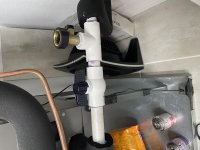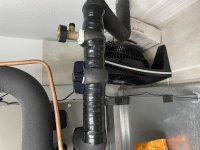- Joined
- Apr 4, 2006
- Messages
- 19,335
- Reaction score
- 30,288
My wife and I moved from the North East down to Florida about 3 years ago. We had a large home on Long Island and had two separate central ac units. At the beginning of each ac season I would perform all needed and required maintenance including coil cleaning, drip line evacuation, filter changes etc. I also checked the freon fill with gauges and temperature differentials. Now I do realize the ac units in NY ran for about 4-5 months and they weren't as stresses as where I live now. I never had any issues after the initial start up and maintenance was done.
Down here we also have two central ac units. One is 4 1/2 tons (for the main house) and the 2 ton Mini-Split is in our 3 car insulated garage. Down here the units must be serviced often, especially in the summer heat and humidity. The most important thing is to flush out the lines! If not, the mucus type goop clogs up the drip lines and backs water up into a float switch which automatically shuts the unit down. It is very easy to do this maintenance, but forget once and sure as the sun will rise tomorrow your unit will drop off line.
Last week we had a house full of guests and it kept getting warmer and warmer. When my wife told me the thermostat was reading 77ºF I knew I had forgotten to clean out the drip tube often enough now that it's hot and humid again. Thankfully I installed a hose connection clean out valve in the main unit drip line and flushing the line took me 5 minutes - still I should not have forgotten to do so often enough! All was good again in a half hour, but I am now putting the clean out maintenance on my reminder list. I have neighbors and friends here as well, and they have had similar issues.
All was good again in a half hour, but I am now putting the clean out maintenance on my reminder list. I have neighbors and friends here as well, and they have had similar issues.
As a PSA, I would suggest that if you live in the South or any place hot and humid, that you clean out or have your unit's drip tube cleaned out for you often, this way you won't have to deal with it getting hot inside the house. While it is only an inconvenience if you are home, it could be a disaster if you are away for extended amounts of time. Black mold can grow, ruin things and it is something that is so easily preventable.
And..... that concludes my PSA for the week.
Down here we also have two central ac units. One is 4 1/2 tons (for the main house) and the 2 ton Mini-Split is in our 3 car insulated garage. Down here the units must be serviced often, especially in the summer heat and humidity. The most important thing is to flush out the lines! If not, the mucus type goop clogs up the drip lines and backs water up into a float switch which automatically shuts the unit down. It is very easy to do this maintenance, but forget once and sure as the sun will rise tomorrow your unit will drop off line.
Last week we had a house full of guests and it kept getting warmer and warmer. When my wife told me the thermostat was reading 77ºF I knew I had forgotten to clean out the drip tube often enough now that it's hot and humid again. Thankfully I installed a hose connection clean out valve in the main unit drip line and flushing the line took me 5 minutes - still I should not have forgotten to do so often enough!
As a PSA, I would suggest that if you live in the South or any place hot and humid, that you clean out or have your unit's drip tube cleaned out for you often, this way you won't have to deal with it getting hot inside the house. While it is only an inconvenience if you are home, it could be a disaster if you are away for extended amounts of time. Black mold can grow, ruin things and it is something that is so easily preventable.
And..... that concludes my PSA for the week.



